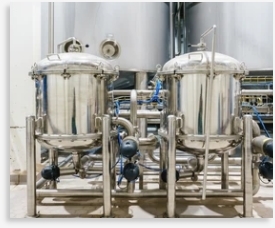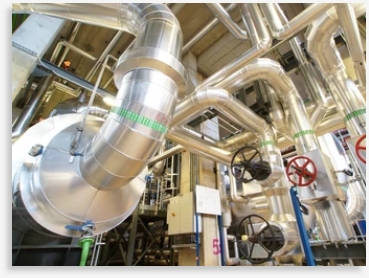Microbial GMP Manufacturing
BOC Sciences' microbial production bases comply with Good Manufacturing Practice (GMP) and can provide customers with microbial fermentation products with the highest quality standards. We provide customers with one-stop services ranging from active pharmaceutical ingredients, enzymes to various fine chemicals. Through the integration of advantageous resources, our production team continuously breaks through the key technologies of microbial fermentation process, and transforms and innovates traditional processes to fully assist the smooth delivery of projects.
Fermentation Definition

Fermentation is a natural metabolic process that occurs under anaerobic conditions and involves microorganisms such as bacteria, yeast or fungi converting sugars and carbohydrates into various products. Fermentation can be divided into brewing industry and fermentation industry according to whether there is a flavor requirement. The conditions required for fermentation include suitable microorganisms, conditions to ensure the metabolism of microorganisms (pH, nutrition, temperature, etc.), equipment for fermentation, and methods and equipment for extracting and refining products. At present, the industrial scope of fermentation mainly includes:
Microbial fermentation: Yeast, microbial protein, algae, active lactic acid bacteria preparations, fungi, biopesticides, etc. For example, yeast cells metabolize sugars such as glucose or sucrose to produce ethanol and carbon dioxide as by-products.
Microbial enzyme fermentation: Most enzymes used in industrial applications come from microbial fermentation. The microbial enzyme fermentation process begins with the selection of a suitable microbial strain with a genetic mechanism to produce the desired enzyme. The strain is then cultured under controlled conditions in a fermenter, a container specially designed to provide optimal conditions for microbial growth and enzyme production.
Microbial metabolite fermentation: Primary metabolites - products produced during the logarithmic growth phase, which are necessary for bacterial growth and reproduction, such as amino acids, nucleotides, proteins, nucleic acids, lipids, carbohydrates, etc.; secondary metabolites - during the static growth phase of bacterial cells, some bacteria can synthesize products with certain characteristics that cannot be synthesized during the growth phase, such as antibiotics, alkaloids, bacterial toxins, plant growth factors, etc.
Microbial transformation fermentation: A biochemical reaction that uses one or more enzymes of microbial cells to transform a compound into a structurally related product with more economic value. It is characterized by strong specificity, including reaction specificity, structural position specificity and stereospecificity.
Microbial Fermentation
BOC Sciences builds a world-class microbial fermentation technology platform, providing a variety of services from strain development to fermentation, purification and so on. We have more than 20 years of rich experience, providing good technical support for microbial GMP production. Examples of business areas:
Fermentation for Pharmaceutical Industry
BOC Sciences combines technical expertise, advanced capabilities, quality assurance, innovation, and customer focus to provide outstanding solutions for the production of pharmaceutical compounds. We have a team of experienced fermentation experts who are well versed in optimizing fermentation parameters such as temperature, pH, oxygen levels, and nutrient supply to ensure successful production of target compounds with high yield and purity. In addition, we can provide end-to-end solutions from process development and optimization to scale-up and commercial production. Our fermentation technologies for the production of pharmaceutical products include, but are not limited to:
- Active Pharmaceutical Ingredients (API)
- Antibodies
- Therapeutic Proteins
- Viral Vectors
- Amino Acids
- Peptides
- Carbohydrates
- Lipids
- Enzymes
- Plasmid DNA
- Steroids
- Opioids
- Antibacterials
- Antifungals
- Antivirals
- Vaccines
Fermentation for Cosmetic Industry
BOC Sciences is dedicated to tailoring fermentation processes for the cosmetics industry, focusing on the production of high-quality ingredients such as amino acids, peptides, collagen, fermented extracts (such as fermented soy extract, fermented yeast extract, buckwheat fermented extract), organic acids (including hyaluronic acid, citric acid and fumaric acid) and other compounds essential for skin care formulations. Equipped with advanced technology and a dedicated team of experts, we are designed to meet the specific needs of the cosmetics industry and provide customized solutions for the production of a wide range of fermentation-derived ingredients used in cosmetic formulations. From initial process development to scale-up and production, BOC Sciences' facilities are capable of handling a variety of fermentation projects with precision and efficiency.
- Hyaluronic acid
- Squalane
- Xanthan gum
- Amino acids
- Peptides
- Collagen
- Fermented extracts (soybean extract, yeast extract, etc.)
- Organic acids (citric acid, fumaric acid, etc.)
Fermentation for Food Industry
BOC Sciences can provide fermentation CDMO services specifically for the food industry. We deeply understand the importance of quality, innovation and sustainability in the food industry and offer a wide range of fermentation-based solutions to meet the industry's evolving needs. From food additives and industrial enzymes to non-animal and plant proteins, alternative proteins, saturated fats, dietary supplements, active probiotics and vitamins, BOC Sciences is at the forefront of creating cutting-edge products that cater to traditional and emerging markets.
- Food additives
- Industrial enzymes
- Plant proteins
- Alternative proteins
- Saturated fats
- Dietary supplements
- Active probiotics
- Vitamins
Fermentation for Agriculture Industry
In agriculture, microbial fermentation can be used to improve soil fertility and promote plant growth. Certain bacteria and fungi can form symbiotic relationships with plant roots, known as mycorrhizae and rhizobia, respectively, to promote nutrient uptake and improve plant health. In addition, microbial fermentation is used to produce biofertilizers and biopesticides, which can improve soil quality, suppress plant diseases, and reduce dependence on chemical inputs, thereby promoting sustainable agricultural practices. BOC Sciences has a proven track record of providing effective and environmentally friendly solutions in the field of pesticides, fungicides, herbicides, and other crop protection products. Our team of experts works closely with customers to develop customized formulations that meet their needs, leveraging our knowledge of the latest trends and technologies in the agricultural industry. BOC Sciences also ensures regulatory compliance and quality control throughout the manufacturing process to guarantee the safety and effectiveness of its products. Our fermentation services for agrochemicals include, but are not limited to:
- Insecticides
- Fungicides
- Fertilizers
- Herbicides
- Plant stimulants
- Plant growth regulators
Microbial Fermentation CDMO
BOC Sciences' microbial fermentation CDMO services offer a comprehensive and integrated approach to microbial fermentation, covering all stages from strain development to cGMP production and packaging. With its expertise, state-of-the-art facilities and commitment to quality, BOC Sciences is well-positioned to support clients in harnessing the power of microbial fermentation to produce valuable compounds across a wide range of industries. Through genetic engineering, mutagenesis and strain selection techniques, BOC Sciences can create strains with higher productivity, yield or product purity, thereby maximizing the efficiency of the fermentation process. Additionally, BOC Sciences excels in fermentation process optimization, where we fine-tune fermentation conditions and parameters to maximize product yield and quality. By optimizing factors such as pH, temperature, agitation, aeration and nutrient supply, BOC Sciences can achieve optimal fermentation performance, resulting in greater efficiency and cost-effectiveness for clients. Our fermentation CDMO services mainly include:
- Strain development services
- Strain improvement services
- Strain screening services
- Biotransformation services
- Fermentation process optimization
- Fermentation cGMP production
- Fermentation purification services
- Fermentation product packaging
Production Facility
As a leader in microbial production, BOC Sciences has a variety of complex processes and high volume production capabilities. We aim to help our clients develop streamlined and controlled manufacturing processes, and to support clients throughout their product journey from pre-clinical through various clinical stages to market entry. Examples of equipment and processes:
Fermentation Equipment
- Equipment of upstream process for fermentation, centrifugation and filtration.
- Fully automatic fermenters of different volumes from 4,000 L to 12,000 L, over 100,000 liters capability in total.
- Recovery and downstream equipment, ranging from industrial-scale chromatography systems, membrane systems to larger scale continuous centrifuges.
- Equipment for waste treatment.
- DSP equipments: Centrifuges, chromatographic separations (IEX, affinity, HIC, SEC, RPHPLC), tangential flow filtration units, protein crystallizer (custom made), spray & freeze-drying, and concentrators.
- Product packaging: Vacuum drying and freeze-drying, etc.
Fermentation Process
- Metabolomics technologies: Combining quantitative metabolomics with the continuous fermentation process, the automatic control of various parameters to maintain a certain level, the improvement of equipment utilization and the output per unit time, and the optimization of the fermentation process.
- The solid-liquid separation technologies: Centrifugation, filtration separation, sedimentation separation, etc.
- Protein purification technologies: Precipitation, chromatographic separation and ultrafiltration.
- Cell breaking technologies: High temperatures, ultrasound, osmotic pressure, surfactant and wall lysing enzymes, etc.
- Immobilized cell technologies: By confining cells within certain spatial boundaries, they retain catalytic activity and can be used repeatedly or continuously over a longer period of time.
- Membrane separation technologies: Microfiltration (MF), ultrafiltration (UF), reverse osmosis (RO), dialysis, electrodialysis (ED), gas separation (GS), permeate vaporization (PV), emulsion membrane (ELM).
Specifications & Guidelines
BOC Sciences excels in ensuring uptime and robust performance of microbial production processes. We always pay close attention to the quality and safety of microbial products in the production process, and have established a series of production specification systems in strict accordance with regulatory guidelines, covering sterility testing, biological protection and pollution prevention. Key aspects of our microbial cGMP manufacturing include facility design and cleanliness, equipment maintenance, personnel training and documentation. Facilities must be designed to prevent contamination and cross-contamination, with separate areas for each stage of production to minimize risk.
Why Choose BOC Sciences?
- Professional team of microbial fermentation engineers. Able to skillfully complete the construction of the production line.
- Strict process parameter control, in full accordance with the process regulations, to ensure product quality.
- Reasonably analyze the non-compliance phenomenon in the production process, solve the unexpected situation, and keep the equipment running normally.
- Raw material and component control, raw material release, process verification, deviation management, batch release and production tracking.
- Material and personnel flow, cleaning, and environmental monitoring in accordance with commercial production facilities.
- General safety and hygiene, personnel safety, routine inspection of closed equipment, and classified waste treatment.
In addition to providing cGMP manufacturing services, we also specialize in custom development services for microbial fermentation processes. We are committed to meeting the unique needs of our customers and excel in designing and optimizing fermentation protocols for a variety of applications. Whether it is scaling up a fermentation process, optimizing yields, or developing new strains, we are committed to helping our customers achieve their microbial fermentation goals. If you are interested in our microbial cGMP manufacturing service, please contact us immediately.




